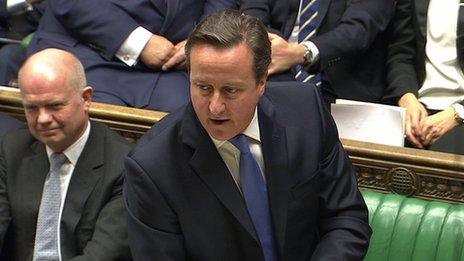David Cameron: 'Buck stops with me' on foreign criminals
- Published

David Cameron has said the "buck stops with me" when it comes to deporting foreign criminals from the UK.
The PM said 22,000 such offenders had been deported since 2010, but that "too many obstacles" hampered the process - including human rights legislation.
But shadow home secretary Yvette Cooper said "tough talk" from the government was simply "not enough".
A report found the number of foreign prisoners in the UK had gone up. Last year £850m was spent managing them.
The National Audit Office (NAO) report found the increase in foreign national offenders (FNOs) had occurred despite a near tenfold increase in officials working on their cases.
There were 12,250 FNOs in the UK at the end of March this year, the report found.
Officials estimated that between January 2009 and March 2014, 151 left prison without being considered for deportation and one in six in the community - 760 convicted criminals - had absconded.
'Too many obstacles'
Addressing the issue at Prime Minister's Questions, Mr Cameron said the government was "making progress" on a "difficult issue to get right".
"The report is very clear that, since 2013, for the first time we've got a proper cross-government strategy to deal with this," he added.
But said there remained "too many obstacles in the way in terms of human rights legislation that we need to change".
Taking an urgent House of Commons question, Home Secretary Theresa May said the issue had "beset successive governments".
She said the main problem the government faced was around "litigation" - saying appeals by offenders had increased by 28%.
"The countless appeals and re-appeals lodged by criminals attempting to cheat the system cost us all money and are an affront to British justice," she said.
And pointing the finger at the previous Labour administration, she said the Home Office "did not prioritise the removal of foreign national offenders before 2005".
However, shadow home secretary Ms Cooper said fewer foreign criminals were being deported each year than in 2010 - despite the prime minister labelling it a "major priority".
Analysis
Dominic Casciani, BBC home affairs correspondent
There have been six commitments or legislative changes since 2006 which ministers have claimed would lead to more removals of foreign national offenders - but the performance hasn't improved. So what's to blame? Ministers, officials, bureaucracy or human rights law?
The law is part of this picture - but the frank reality is that removing some FNOs is legally extremely difficult if they have a genuine and provable connection to the UK - such as British-born children.
But page after page of the NAO report shows there have been huge bureaucratic failings - missing case files, officials from different parts of government incapable of sharing information. Some 35 offenders stayed last year because somebody forgot to take their passport to the airport. Another seven removals failed because nobody had booked them a plane ticket.
That's why many, many critics say the real problem is the dysfunctional nature of an immigration service that, in the infamous words of former Home Secretary John Reid, is not fit for purpose.
'Blame game'
"It's no good blaming appeals and human rights because the NAO has found that over a third of failed removals were the result of factors within the Home Office's control," Labour's Ms Cooper told MPs.
"Failure to fill in the forms, failure to get the papers there, failure even to book the plane tickets that were needed."
The government was "simply not doing enough", she added.
BBC assistant political editor Norman Smith said the Commons exchanges had been a "pretty ugly blame game" with a lot of "finger pointing".
And Tania Bassett, of the National Association of Probation Officers, said "massive" cuts to the Ministry of Justice's budget had led to ongoing issues with "failing IT systems and antiquated systems of processing data and offenders".
She added: "The Ministry of Justice, in terms of working with foreign national prisoners, has actually very little contact with the Home Office, and we need a government policy that actually brings those two systems and those two departments much closer together."
- Published22 October 2014
- Published30 January 2014
- Published30 September 2013
- Published27 October 2011